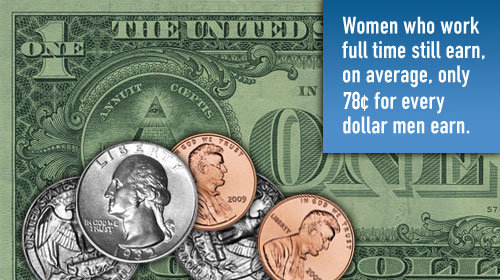Paycheck Fairness Act: 50th Anniversary of the Equal Pay Act of 1963


This landmark piece of federal anti-discrimination law was one of the very first to address gender-based pay disparities. On the day he signed it, President Kennedy called the act a "first step" which "affirms our determination that when women enter the labor force they will find equality in their pay envelopes." But he noted that "much remains to be done to achieve full equality of economic opportunity. . . ."
Fifty years later, we have made a great deal of progress, but there is still much to be done. Over the last half century, that law has been weakened by loopholes, inadequate remedies, and adverse court rulings, resulting in protection that is far less effective than Congress originally intended. On average, women today earn just 78 cents for every dollar that men earn — a mere 17 cents on the dollar increase since the Equal Pay Act was enacted. The figures are even more dismal for women of color. African American women are paid only 64 cents and Latinas, only 54 cents, as compared to white men.
At his second inaugural address this January, President Obama made clear that we still have a long way to go, saying, "[O]ur journey is not complete until our wives, our mothers and daughters can earn a living equal to their efforts." At his State of the Union address, he asked Congress "to declare that women should earn a living equal to their efforts and finally pass the Paycheck Fairness Act this year."
This year, the ACLU will work to finally close the wage gap, by advocating for the passage of the Paycheck Fairness Act and the Equal Employment Opportunity Restoration Act. The ACLU will also be asking the administration to take immediate action, by issuing an executive order that would protect employees of federal contractors from retaliation for discussing or asking about their wages. Following years of advocacy by the ACLU, the Department of Labor recently announced that the Office of Federal Contract Compliance Programs (OFCCP) is rescinding two harmful guidance documents on pay discrimination originally issued in 2006. This action will immediately enable OFCCP to better conduct investigations of contractor pay practices consistent with Title VII of the Civil Rights Act of 1964.
We look forward to more victories in 2013. After 50 years, it is well past time for equal pay.
Pay Equity
The ACLU works to end discrimination in the workplace and ensure that all workers — regardless of sex, race, national origin, age or disability—are able to bring home every dollar they rightfully earn. As a result of discrimination, including employers’ reliance on gender stereotypes, women lack parity with men in earnings.

Pay Equity
Source: American Civil Liberties Union
Resources
Pay Equity Cases
The ACLU, ACLU affiliates, and other partners are working to achieve pay equity. Learn more on our cases about pay discrimination, hiring and promotions, and gender steering.
Pay Equity - Cases
The ACLU works to end discrimination in the workplace and ensure that all workers — regardless of sex, race, national origin, age or...
Source: American Civil Liberties Union
Pay Equity Legislation and Federal Advocacy
To address pay discrimination, the ACLU advocates for the passage of legislation that protects the right to go to court to fight discrimination. This advocacy includes fighting for the Lilly Ledbetter Fair Pay Act, which in 2009 gave employees back their day in court to challenge discriminatory pay practices, and the Paycheck Fairness Act, which will give employees the legal tools they need to challenge the wage gap itself.
Pay Equity Legislation and Federal Advocacy
To address pay discrimination, the ACLU advocates for the passage of legislation that protects the right to go to court to fight discrimination....
Source: American Civil Liberties Union

